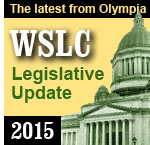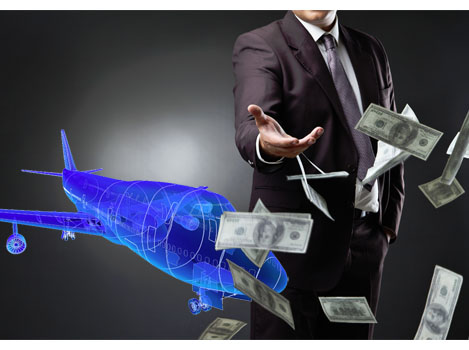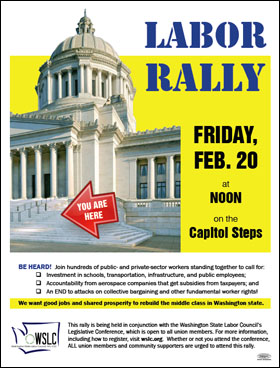STATE GOVERNMENT
WSLC Legislative Update: We’re being taken for a ride
Taxpayers are subsidizing low-wage, job-cutting aerospace companies

 Today’s edition of the WSLC Legislative Update newsletter:
Today’s edition of the WSLC Legislative Update newsletter:
OLYMPIA (Feb. 10, 2015) — As George W. Bush reminded us all, “Fool me once, shame on you… (pause)… you fool me… you can’t get fooled again.”
When our elected officials rushed into special session in November 2013 to approve aerospace industry tax breaks worth some $8.7 billion over 16 years, we were told that the incentives would grow — or at least maintain — good family-wage jobs.
Our state had been burned before when these tax incentives were first created in 2003. Boeing promised to assemble the 787 in our state, but the legislative language was loose enough that the company expanded 787 production outside the state while keeping all of its multi-billion tax break. So in 2013, when those tax incentives were extended from 2024 to 2040, the Legislature added “intent” language to maintain and grow good aerospace jobs in Washington and some narrow contingencies intended to guarantee all 777X final assembly and wing assembly here.
But within weeks of its passage, we got burned again.
 Boeing announced it would be moving thousands of engineering jobs from Washington out of state and out of country. Unlike tax incentives in Missouri, South Carolina and other states, there were still no requirements in Washington’s law to ensure that the tax breaks actually increase the number of jobs. So 15 months after getting an $8.7 billion extension of the tax breaks, Boeing has about 2,500 fewer employees in Washington today than it did before those tax breaks were approved. The company has announced plans to move a total of more than 6,000 technical and design jobs out of Washington.
Boeing announced it would be moving thousands of engineering jobs from Washington out of state and out of country. Unlike tax incentives in Missouri, South Carolina and other states, there were still no requirements in Washington’s law to ensure that the tax breaks actually increase the number of jobs. So 15 months after getting an $8.7 billion extension of the tax breaks, Boeing has about 2,500 fewer employees in Washington today than it did before those tax breaks were approved. The company has announced plans to move a total of more than 6,000 technical and design jobs out of Washington.
Aerospace tax breaks don’t just go to Boeing. They also go to hundreds of aerospace companies and suppliers. An estimated one third of non-Boeing aerospace employees in the state earn less than $15 per hour. Those workers’ families likely qualify for state assistance for health care, housing and other basic necessities.
In other words, because our aerospace tax incentives lack the accountability standards required in most states, Washington taxpayers are subsidizing one of biggest corporations in the world even as it sheds jobs in our state. Plus, we are subsidizing low-wage aerospace companies that have employees who can’t meet their families’ basic needs.
The taxpayers of this state — and the businesses that don’t get this preferential tax treatment — deserve better. That’s why the Washington State Labor Council supports the efforts of the Society of Professional Engineering Employees in Aerospace/IFPTE 2001 and Machinists Union District Lodge 751 to change our tax incentive law to create some accountability. It’s not enough to declare an intent to create jobs that pay a decent wage, it should be a requirement. Companies that add good jobs should get the tax incentive, those that cut jobs or pay low wages shouldn’t.
HB 1786, sponsored by Rep. Mia Gregerson (D-SeaTac), would require aerospace firms receiving the incentives to pay their veteran employees at least the state median wage for a one-earner family, which is currently about $52,000 per year. Another bill will be introduced soon to ensure that companies receiving aerospace tax incentives don’t have net losses of jobs.
“In reality, the taxpayers end up subsidizing those (low-wage) employers twice,” IAM 751 President Jon Holden testified Monday at the House Labor Committee hearing on HB 1786. “We subsidize them for their profits and then we subsidize their employees with school lunch programs, subsidized housing, subsidized health care, and often times, they need to go to food banks just to get by.”
Naturally, Boeing disagrees.
“Changing the legislation undermines the confidence of all businesses that the state will honor its commitments,” the company said, without irony, in a statement. An aerospace supplier similarly testified Monday that HB 1786 would be “a retroactive restriction on a deal that was already made.”
Some would say Boeing changed the deal — given the bill’s intent language about maintaining and growing jobs here — by announcing the elimination of thousands of Washington jobs within days of getting the tax break. Regardless, the Legislature has changed the aerospace tax incentives many times since they were first enacted in 2003, but mostly it was to expand eligibility for more and more aerospace firms. Clearly this legislation can be changed to benefit the companies getting tax breaks, It should also be changed to ensure that companies keep their promises to create and maintain good jobs in Washington.
At a time when our state government is failing its paramount duty to pay for basic education, our transportation infrastructure is crumbling and in desperate need of investment, and the people who provide essential state services haven’t had a cost-of-living raise in seven years, all tax incentives deserve close scrutiny to ensure they are achieving their goals.
The WSLC urges all legislators to support HB 1786 and other efforts to maintain aerospace tax incentives that keep and grow our well-paid aerospace workforce.
CONTACT YOUR LEGISLATORS! Click here to send a message to your Senator and Representatives urging their support of tax incentive accountability that maintains and enhances our state’s aerospace industry and workforce.
Shared Prosperity bills to be heard
The House Labor Committee chaired by Rep. Mike Sells (D-Everett) has advanced several important bills that are part of the WSLC’s 2015 Shared Prosperity Agenda. Several of them have been referred to the Appropriations Committee before they can get a full vote in the House. We are eager for the bills to be heard soon to make the fiscal case about why these policies are good for local economies and our state. They include:
► HB 1354, sponsored by Rep. Cindy Ryu (D-Shoreline), to grant administrative and legal remedies to employees who face retaliation from employers for reporting violations of minimum wage and prevailing wage laws.
► HB 1355, sponsored by Rep. Jessyn Farrell (D-Seattle), to accelerate the state’s minimum wage increases so the lowest legal wage reaches $12 an hour in four years.
► HB 1356, sponsored by Rep. Laurie Jinkins (D-Tacoma), to allow all workers in Washington to earn at least 40 hours of paid sick and safe time off per year.
If you or someone you know has firsthand experience with trying to survive on the minimum wage, suffering because you can’t afford to take time off when sick or to care for a sick loved one, or have experienced retaliation for reporting wage violations, please email David Groves or call him at 206-281-8901 ext. 4911 to share your stories.
Reception, Conference, Rally
All rank-and-file members, staffers and leaders of the unions that comprise the Washington State Labor Council are invited to participate in the council’s annual Legislative Reception and Conference set for Feb. 19-20 in Olympia.
The WSLC Legislative Reception, which is a great opportunity to mix and mingle informally with state lawmakers and fellow union members, will be from 6:30 to 8:30 p.m. on Thursday, Feb. 19 at the Olympia Red Lion.
 The WSLC Legislative/Lobbying Conference will begin at 8:30 a.m. on Friday, Feb. 20 at the WSLC’s Olympia office building, 906 Columbia St. SW. Buses will pick up folks at the Red Lion hotel that morning to shuttle them to the WSLC office, where parking is limited. After breakfast and a quick briefing/lobby training, participants will walk to the nearby Capitol campus to meet with their senators and representatives.
The WSLC Legislative/Lobbying Conference will begin at 8:30 a.m. on Friday, Feb. 20 at the WSLC’s Olympia office building, 906 Columbia St. SW. Buses will pick up folks at the Red Lion hotel that morning to shuttle them to the WSLC office, where parking is limited. After breakfast and a quick briefing/lobby training, participants will walk to the nearby Capitol campus to meet with their senators and representatives.
At noon on Friday, Feb. 20, conference participants will be joined by more union members and community supporters at a rally on the steps of the Legislative Building to call for support of a shared prosperity agenda.
Register online for the Reception and Conference or get more information about the reception/conference. Also, please download and share the rally flier.





